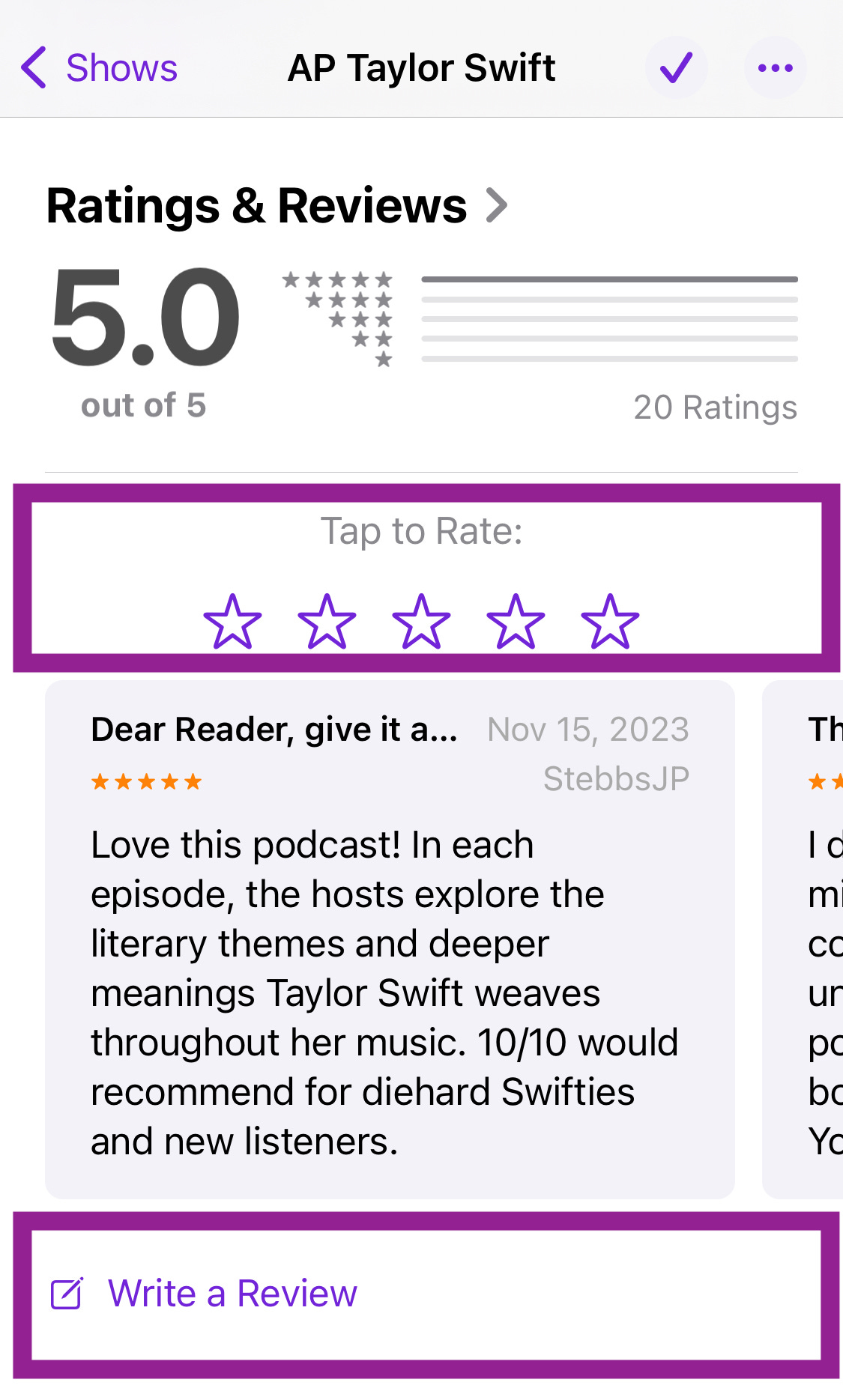We get deep into our feelings on this week’s deep dive with “Death By a Thousand Cuts,” from Lover. With a title referencing an imperial form of torture, what is this Taylor Swift song really about? As always, our hosts look at the lyrics from very different perspectives based on our own personal experiences, from moving out of a childhood home (“chandelier still flickering here”) to a breakup (“You said it was a great love”) to Spiderman (“I see you everywhere”). We talk about idioms, loss, grief, the emotional burden of pain, and how asking the traffic lights for answers maybe isn’t as far-fetched as some of us originally thought. Will we ever hear this song the same way again? “I don’t know!”
A sneak peek into this week’s episode:
Rate, Review, Subscribe!
Did you know ratings and reviews don’t just flatter us, they actually help others find our podcast as well? If you’ve enjoyed our show, please rate us on Spotify or Apple, and give us a review on Apple Podcasts. We love reading what you think, and every 5-star review helps someone else find us.
This week’s extra credit - Brought to you by Jodi
Come with me, dear reader, on a journey of first not knowing what the hell to write about for Extra Credit!
First, I thought I’d write about a few specific lines in the song that cause the most confusion or have the most to unpack. “My, my, my, my,” “I ask the traffic lights if it’ll be alright,” “united we stand / our country, guess it was a lawless land".
Then I thought, “I should unpack the title itself—there’s so much in the phrase “death by a thousand cuts”
Then my mind went to, “why did she call the song “death by a thousand cuts”? What is it about “death” specifically? Does she talk about death a lot in her music? It’s a very poetry thing to do.”
And finally, what I landed on the “a ha” moment:
“Dorothy Parker wrote about death all the time, I wonder if there’s a connection between Taylor Swift and Dorothy Parker?”
So welcome, reader, to today’s extra credit, where I pull down two books from my 10th grade English class on Dorothy Parker, and attempt to find connections between the rainbows and butterflies of Lover-writer Taylor Swift, and the sarcastic, pessimistic, death-obsessed poet, Dorothy Parker.
tl;dr: Who is Dorothy Parker?
Born in 1893, Dorothy Parker was an American poet, author, and “literary phenomenon” who made her mark with her “spicy verbal wit” with puns like “You can lead a horticulture, but you can’t make her think,” and pithy, pointed poems like “News Item” which reads:
Men seldom make passes
At girls who wear glasses.
She had a distinctive voice throughout her poems and short stories, and wrote for literary magazines and newspapers like The New York Times, Vanity Fair, and The New Yorker. Biographer John Keats (not that one), in his book You Might As Well Live: The Life and Times of Dorothy Parker, described a childhood Dorothy as a “feminist truth-seeker, seeing everything quite clearly and coldly through those great, lambent eyes and saying, albeit to herself, exactly what she thought about the people she beheld” (20).
Perhaps the only thing that changed about Dorothy as she grew up was that she no longer kept what she thought to herself. As the only female in the group of literati who founded the Algonquin Round Table, she frequently let her “caustic, urbane, and neurotic” wit come through in her biting poems, sketches, essays, short stories, and magazine columns, whose topics often covered death, heartbreak, suicide, love affairs, misogyny, depression, and human folly. Perhaps the best summary you can get of Parker’s poetry if you haven’t actually read Parker’s poems comes in the introduction to Dorothy Parker: Complete Poems:
Parker’s attitude toward human folly was satiric; her poems mock and undermine as they unfold through repetitions that underscore and heighten her satirical intent. By making readers pay attention to who is speaking and what the implications of these messages are, Parker forces readers to read behind and between the lines of her deceptively simple situations and messages in order to appreciate and fully understand her art. “The purpose of the writer is to say what he feels and sees,” Parker insisted. “Those who write fantasies” she did not consider artists.” (xxii-xxiii)
Connecting Dorothy and Taylor in Death and Heartbreak
What are some of those poems about death and heartbreak? Her poem “The Trifler” begins the first stanza with:
Death’s the lover that I’d be taking;
Wild and fickle and fierce is he.
Small’s his care if my heart be breaking—
Gay young Death would have none of me.
The poem continues with the personification of Death as her lover, how she, as a woman, must remain chaste (“no one other my mouth had kissed”), must wait for Death/a man, as is her purpose. And yet, at the end of the poem, Death jilts her:
Gone’s my heart with a trifling rover.
Fine he was in the game he played—
Kissed, and promised, and threw me over.
And rode away with a prettier maid.
While Taylor’s songs about heartbreak are not quite as biting or scathing toward men in general with regard to romance, she does get Dorothy-esque when talking about the men who have jilted her in her career. In My Tears Ricochet we see Taylor contemplate her own mortality in terms of her career longevity. It’s riddled with death imagery, chanting hauntingly in the chorus “And if I'm dead to you, why are you at the wake?” The person she’s talking to seems to either be the cause of her death, or someone who has two-timed and took advantage of her during her life, only to relish in her demise
You know I didn't want to have to haunt you But what a ghostly scene You wear the same jewels that I gave you As you bury me
How else are Dorothy Parker and Taylor Swift similar?
In a 2022 review of Midnights, NPR reporter Ann Powers noted, “Those who treasure Swift's Dorothy Parker side, her wit and tartness, needn't worry. She's up to her old ways in songs like "Karma" (it's her boyfriend, the breeze in her hair on the weekend, a relaxing thought) and "Vigilante S***," a vampy number whose dropped beat recalls "killer" by FKA twigs.”
As seen in My Tears Ricochet, this Dorothy Parker side of Taylor comes up a lot more than on just Midnights. Taylor not only calls out the double standards between treatment of men and women, she does so with her own “spicy verbal wit” on Blank Space, The Man, My Tears Ricochet, Mad Women, and Mastermind to name a few.
Pop quiz: Is this a Dorothy Parker poem or a Taylor Swift lyric?
They tell you while you're young
"Girls, go out and have your fun"
Then they hunt and slay the ones who actually do it
Answer: Taylor Swift, Nothing New (Red (Taylor’s Version), From the Vault.
What about this one:
In youth, it was a way I had
To do my best to please
And change, with every passing lad,
To suit his theories.
But now I know the things I know,
And do the things I do;
And if you do not like me so,
To hell, my love, with you!
Answer: Ok, the language gives it away as Dorothy Parker (“Indian Summer,” Enough Rope, 1926).
To me, Parker’s “Indian Summer” and Taylor’s Nothing New both deal with the societal expectations set for young women, and how two different artists chose to grapple with those expectations. As a young songwriter, Taylor struggled with thinking her career was over once she was no longer the shiny “new” thing at 22. While this worried her as a young artist, we see her perspective mature to mirror Parker’s “and if you do not like me so, to hell, my love, with you!” attitude as early as reputation in Look What You Made Me Do; and this attitude only gets stronger in subsequent albums, with I Forgot That You Existed giving off distinctly Parker-esque vibes.
I’m really just scratching the surface of parallels between Dorothy Parker and Taylor Swift. Like Parker, Swift picks every syllable, syntax, and space with purpose and intention. None of it was accidental, and everything not only has meaning—it often has a double meaning. Both women have witty, intricate wordplay, the type of humor that requires intelligence, self-awareness, and the ability to be self-referencial and self-depricating. I quote again from the introduction to Dorothy Parker: Complete Poems:
“Because she was a genius, she was a rarity…Her art was highly personal art, an autonomous talent, not an alienated artifact of culture or legend; her creativity transcended her notoriety. She was a rebel working in a male-dominated literary tradition, and her humanism took oppression, particularly female oppression, as its most common subject. Her legacy can best be summed up as serious art…” (xxviii)
Replace the word “literary” with “music,” and I suspect one day the same could be written about Taylor. Her music and song writing are highly personal art. They are artifacts of her time, and culture, and her legend. Taylor is an artistic rebel, in a male-dominated society, dedicated to changing the narrative around female oppression and female success. I love thinking about Taylor Swift, creating her own Algonquin Round Table, using her songs to blaze a trail for women the same way Dorothy Parker did with her poetry. Because after all, Taylor is a poet.






